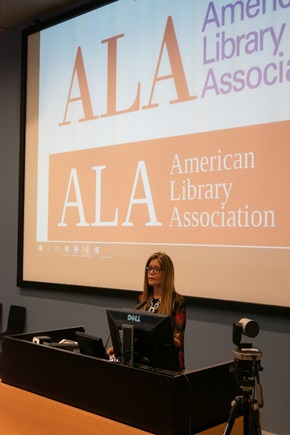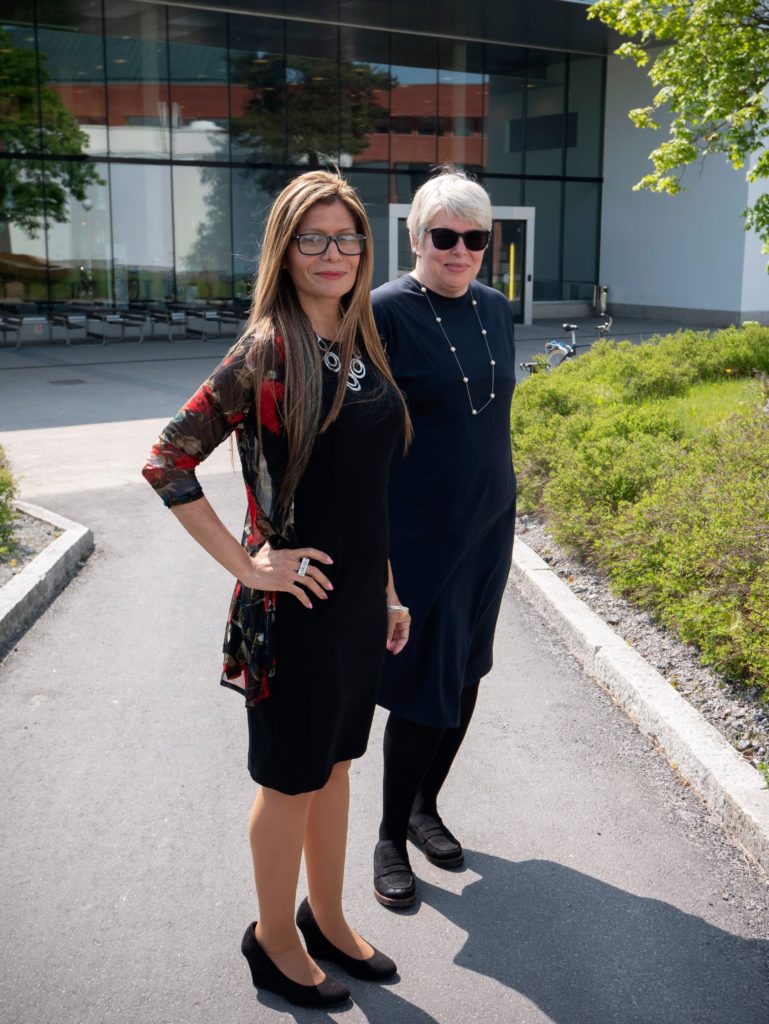
American Library Association (ALA) President Loida Garcia-Febo held an inspiring guest lecture in Tritonia on the 5th of June. During the lecture, Garcia-Febo talked about the significant role of libraries in the society. She also introduced us to the work of ALA, libraries and librarianship in the United States and worldwide.
”Because libraries bring us together”
Libraries worldwide strive to be as including as possible, and to offer services equally to everyone. Today information can be found everywhere, but library workers still play an important role in organizing information and making it accessible. Libraries have an impact on people’s lives – to educate, to find jobs, to increase their income, to learn more about society and to participate in developing it.
ALA is a large association with several divisions. The association is actively taking part in, taking a stand for and pointing out important topics, both regarding libraries and the society in general. ALA has several employees, which enables a diverse range of activities. They have lots of activities not directly connected to libraries. ALA aims to take part in the society on many different levels and they work actively for justice, diversity and inclusion. ALA focuses on marketing and the association is active on social media. Some of their established hashtags are #LibrariesStrong, #Together and #LibrariesTransform.

Loida Garcia-Febo in Tritonia
Garcia-Febo repeatedly points out how important libraries are in the modern society. The Center for the future of libraries identifies relevant trends for libraries and library workers, divided into seven categories. Their website includes more information on why these trends develop and why they are essential for the libraries.
“We are creating the future of libraries every day.”
One of ALA’s divisions is The Association of College & Research Libraries (ACRL). ACRL develops programs, products and services to support the staff of academic libraries to learn and innovate within the academic society. ACRL has diverse tools that are free of charge, also for non-ALA members. For example, ACRL has published Framework for Information Literacy for Higher Education, and to support the use of the framework ACRL Framework for Information Literacy Toolkit and ACRL Framework for Information Literacy Sandbox were launched. ACRL also offers the free service Project Outcome, to help libraries understand and share the impact of their services.
After the lecture, we got a brief interview with Garcia-Febo. We discussed her thoughts about the future challenges of libraries and librarianship.
Garcia-Febo thinks that the attitude towards libraries is good in general. “Libraries are all about people” – the library will always be relevant because we focus on people. Librarians are the link between information and the people seeking information. Garcia-Febo believes that if we market ourselves by emphasizing how we help people find, analyze and use information, we could get more support from decision makers and members of the society. Library workers of the future need to be creative, curious and flexible, and want to work with people. She also highlights the importance of working together, not only within the organization and on a regional level, but also on a national and international level.
“You cannot take the librarians out of the equation, it would be incomplete”
Garcia-Febo’s greetings to university boards regarding funding and the future of academic libraries are that libraries are at the center of research, student retention and the university success rate. Libraries need to be given resources to move forward with the mission of supporting the university. The library is a part of the ecosystem of the university. You cannot take the librarians out of the equation, it would then be incomplete.
So what does the future of the book look like? Garcia-Febo believes that books will be an essential part of our lives even in the future. However, she thinks that we will primarily listen to audiobooks and that textbooks will mainly be in e-book format.
If you are interested in ALA´s activities, you can subscribe to their newsletter Read for later.

Loida Garcia-Febo and Anne Lehto
Text: Pia-Maria Niemitalo & Gun Vestman
Photo: Jonna Toukonen
